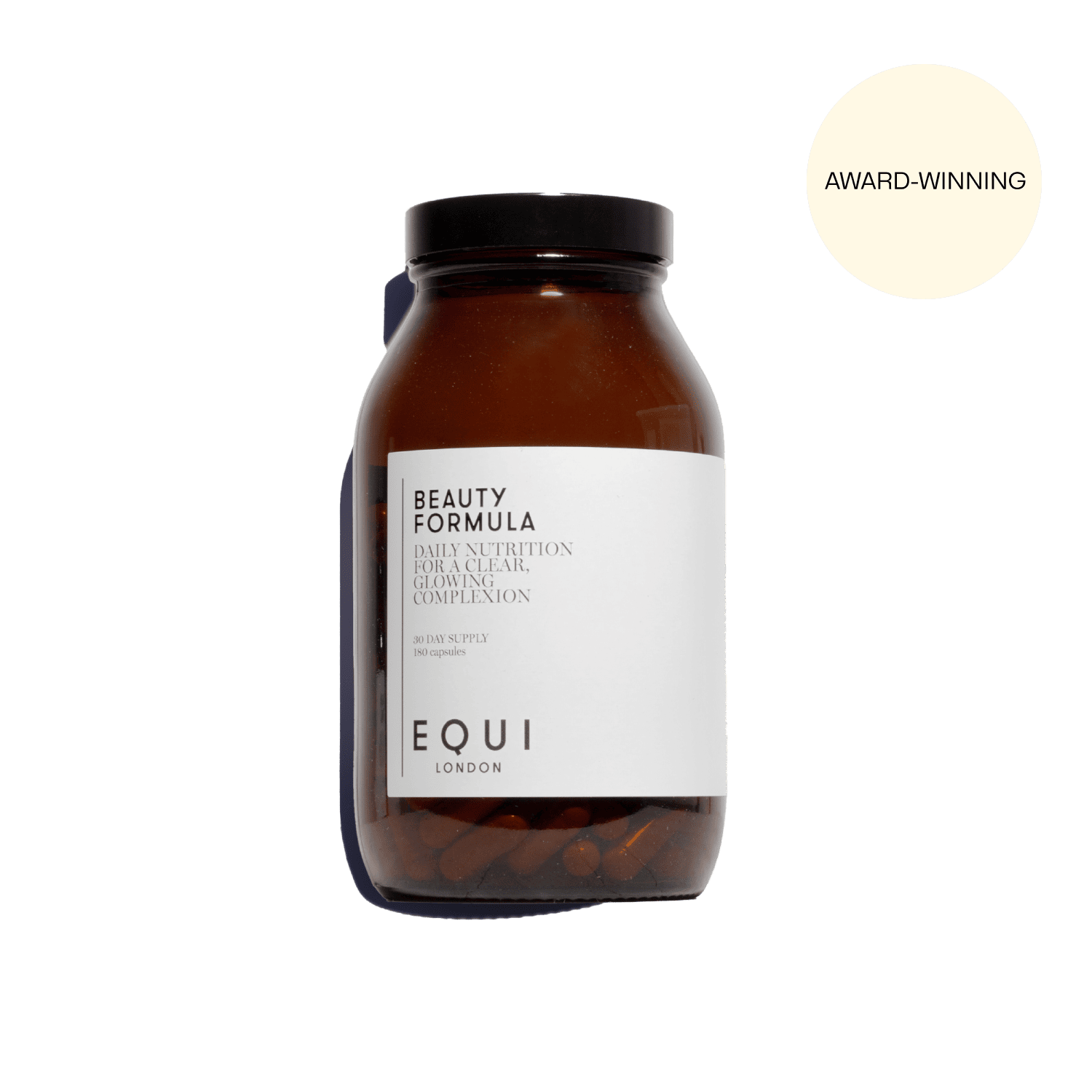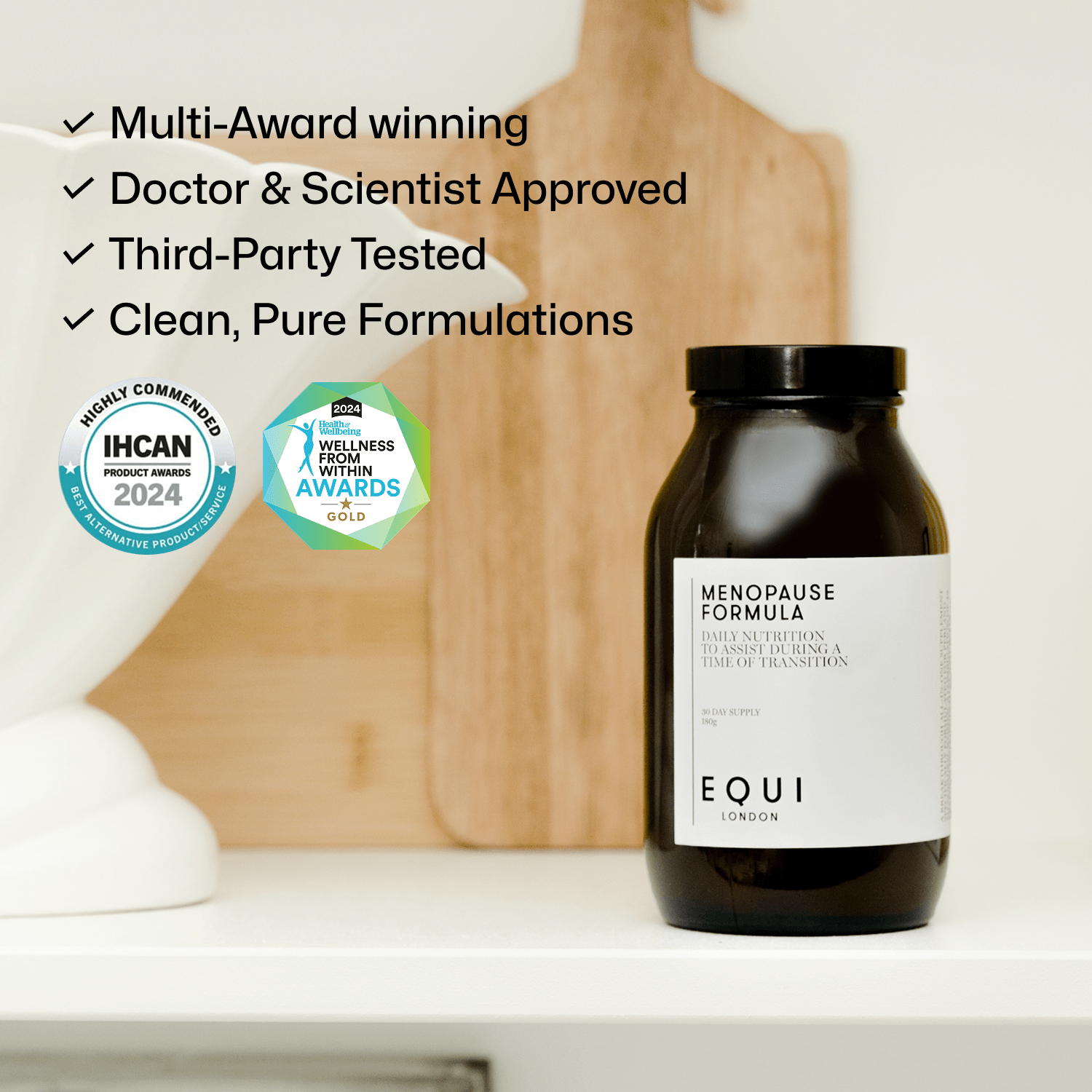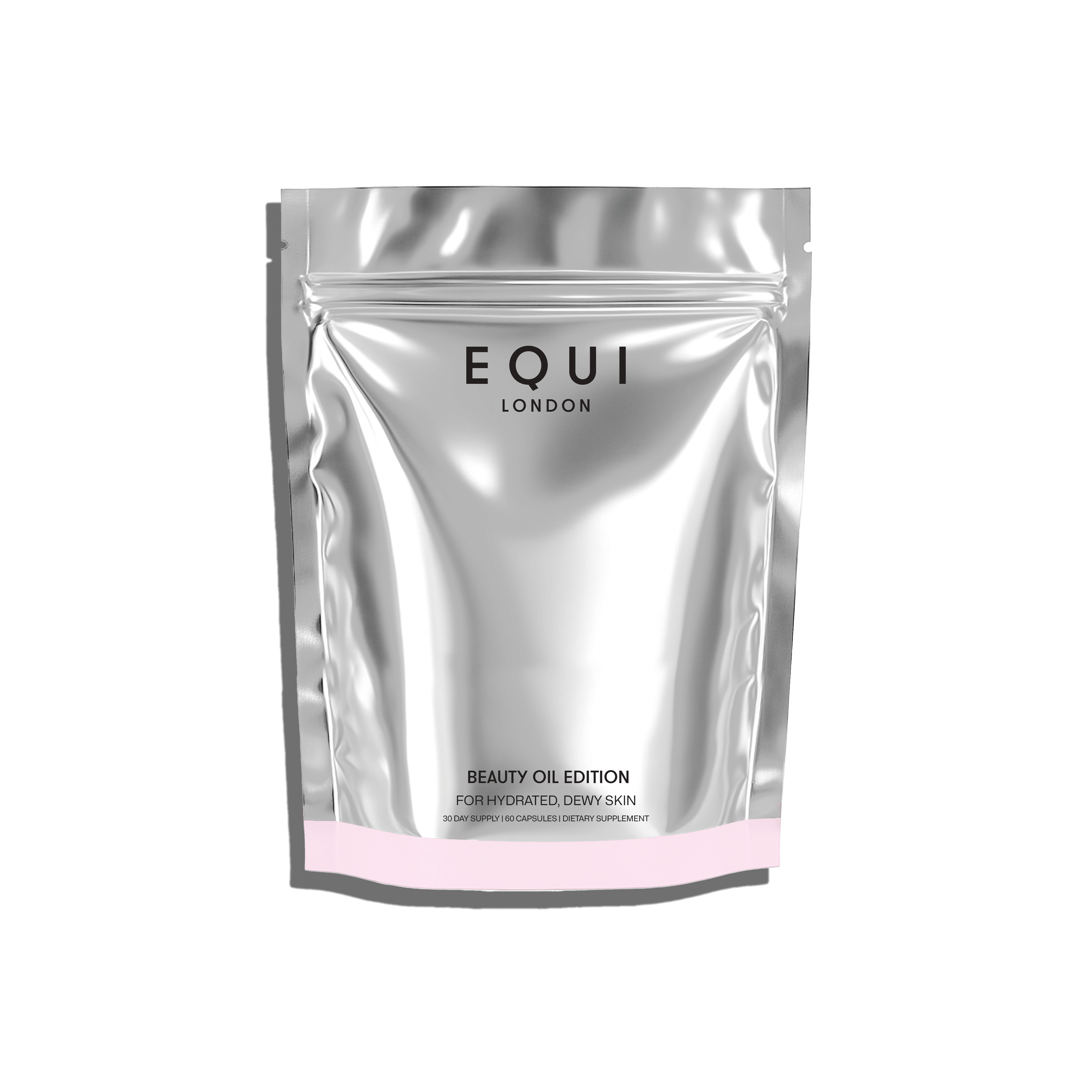
Menopause is a significant milestone in a woman’s life, signalling the end of the reproductive years, but also heralding a new phase filled with its own unique challenges and opportunities. With the changing hormonal landscape comes a spectrum of symptoms – hot flushes, mood swings, and sleep disturbances to name a few. While these transitions are a natural part of life, the journey through menopause doesn't have to be a turbulent one. Enter KSM66® Ashwagandha, a potent adaptogen that has become the centrepiece of holistic approaches to menopausal health, and a pivotal ingredient in the award-winning Menopause Formula.
But why has ashwagandha gained such prominence? Rooted in ancient Ayurvedic traditions, this potent herb has been used for over 3,000 years to restore balance and vitality in the body. Today's science continues to reaffirm its use, particularly in its ability to modulate stress, regulate cortisol levels, promote a harmonious sleep/wake cycle, and support hormonal balance in the body. As many of us will agree, the symptoms of menopause often feel amplified by the stresses of modern life. The connection between cortisol, our primary stress hormone, and the symptoms of menopause can no longer be overlooked, which is where Ashwagandha comes in.
KSM66® is a specialised extract of ashwagandha and it stands out in its efficacy and potency. It's not just another supplement on the shelf but has been meticulously crafted to ensure maximum benefit. The story behind its inclusion in Menopause Formula began with understanding the multifaceted challenges women face during menopause. With sleep disturbances playing a significant role and stress being an unwanted companion in our lives today, a solution was sought that would address these concerns at their root, rather than merely just masking symptoms. During our research when developing Menopause Formula, KSM66® Ashwagandha emerged as a star ingredient to include, not just for its adaptogenic properties but for its holistic benefits that encompass emotional, physical, and cognitive health. It's no wonder then that Menopause Formula, fortified with this powerful ingredient, is award-winning, echoing its efficacy and the difference it has made in the lives of countless women.
Today’s blog will explore the multifaceted benefits of KSM66® Ashwagandha, shedding light on its traditional use, its modern-day relevance, and promising role in supporting women through the menopausal transition. Whether you're a woman experiencing either perimenopause or post-menopause, or simply someone looking to support a loved one through this phase, our blog aims to empower you with knowledge and a natural ally in your journey to optimal well-being.
Understanding KSM66® Ashwagandha
In traditional medicine, certain herbs stand the test of time with their efficacy echoing through the ages. One herb, hailed as a panacea in the ancient Ayurvedic scripts, is ashwagandha. Its Sanskrit name translates to 'smell of the horse', owing not just to its unique aroma but also to its reputed ability to impart the strength and vitality of a stallion. At its roots, ashwagandha (scientifically known as withania somnifera) is an adaptogenic herb, which means it helps the body adapt to stress, restoring equilibrium. Originating from India, this potent herb has been utilised in Ayurvedic practices for over 3,000 years. It holds a position like Ginseng in traditional Chinese medicine – revered, respected, and often recommended for a spectrum of health concerns.
Historically, ashwagandha's primary use has been as a 'rasayana', a term in Ayurveda for herbs that rejuvenate, provide energy, and promote a vibrant life. In Ayurvedic medicine, ashwagandha is frequently mentioned as a tonic for overall vitality, particularly effective in mitigating the debilitating effects of prolonged stress, both mental and physical. Modern science, in its quest to understand traditional wisdom, has delved deep into ashwagandha's properties, often corroborating what Ayurvedic practitioners have known for ages. For instance, one study highlighted ashwagandha's role in enhancing stamina and endurance, attributing these effects to its antioxidant properties that prevent cellular damage during stress (1). Its adaptogenic capabilities have also been the subject of significant research. Another study revealed that those who consumed ashwagandha exhibited a significant reduction in cortisol levels, the body's primary stress hormone, compared to those who didn't (2). This reduction not only denotes a lower stress response but also implies a more balanced state of mind and body. Furthermore, ashwagandha's promise extends beyond just mitigating stress. In terms of rejuvenation and vitality, another study found that it enhanced muscle strength and recovery, aligning with its traditional use as an energy booster (3).
Despite its deep roots in tradition, it's essential to approach ashwagandha, like all herbs, with a balance of reverence and caution. Its power lies in its ability to restore balance, and the key is in ensuring the right dosage and form, tailored to individual needs. Furthermore, the beauty of ashwagandha, remains in its duality – its ancient legacy and its modern relevance. As we find ourselves in a world where stressors are hard to avoid and vitality dwindles as we naturally age, turning to time-tested solutions like ashwagandha can pave the path to a more balanced, vibrant life.
The Stress-Menopause Connection and Ashwagandha
The journey of menopause is a profound physiological transition for women. Characterised by hormonal fluctuations, menopause can lead to a myriad of symptoms, from hot flushes to mood swings. While many factors can exacerbate these symptoms, the intricate relationship between stress, cortisol, and menopause stands out as particularly impactful.
Stress, both physical and emotional, is a common life experience. However, during the menopause, the body's ability to manage and adapt to stress can be compromised. The declining oestrogen levels, inherent to menopause, often coincide with heightened vulnerability to stress. Such enhanced sensitivity can, in turn, accentuate menopausal symptoms. At the core of our physiological stress response is cortisol, known as the "stress hormone". Produced in the adrenal glands, cortisol helps regulate various bodily processes, from metabolism to the inflammatory response. However, during times of stress, cortisol production surges to equip the body to handle perceived threats - the "fight or flight" response. In the context of menopause, persistently elevated cortisol levels due to chronic stress can be problematic. Elevated cortisol has been associated with worsened sleep quality, increased abdominal fat, mood disturbances, and heightened cardiovascular risk—all common concerns during menopause (4). More so, there's a bidirectional relationship: while chronic stress elevates cortisol and exacerbates menopausal symptoms, these very symptoms can cause further stress, creating a vicious cycle.
Enter KSM66® Ashwagandha. Derived from the withania somnifera plant, this particular extract of ashwagandha has undergone numerous clinical trials and is acclaimed for its adaptogenic properties. An adaptogen, by definition, is a substance that enhances the body's adaptive response to stress and balances physiological processes. KSM66® ashwagandha has been shown to help modulate cortisol levels. One study found that those taking ashwagandha experienced a significant reduction in cortisol levels, and consequently, reported lower stress and improved sleep quality (5). By helping the body adapt and respond better to stress, ashwagandha can effectively break the cycle between heightened cortisol, exacerbated menopausal symptoms, and subsequent stress. Finally, KSM66® ashwagandha has a broad-spectrum action, not limited to just modulating cortisol. It also supports various other systems, from the endocrine to the neurological, offering holistic benefits. So, it may come as no surprise that we have turned to it as a natural remedy to alleviate the compounded stressors of menopause through our award-winning Menopause Formula.
Ashwagandha and the Sleep/Wake Cycle
Sleep, the cornerstone of health, takes on profound significance during menopause, a time of much physiological change for women. The transitional phase of menopause, marked by fluctuating hormone levels, known as perimenopause, can bring a barrage of symptoms, and among the most exasperating is disrupted sleep. Understanding the intricacies of sleep during perimenopause and the potential for interventions, such as the use of ashwagandha, is pivotal for well-being during this phase.
A vast majority of perimenopausal women report difficulties with sleep (6). Whether it's the unsettling hot flushes, night sweats, or the psychological distress that occasionally accompanies menopause, these disturbances can fracture sleep. Additionally, the decrease in oestrogen and progesterone—hormones that play roles in sleep regulation—can disrupt the architecture of sleep itself, leading to problems such as insomnia or fragmented sleep (7). What’s more, our circadian rhythm, the body's internal clock, governs various physiological processes, sleep being paramount among them. A balanced sleep/wake cycle ensures not just rest and rejuvenation, but also optimal cognitive function, emotional well-being, and metabolic health. During menopause, when the body is navigating a multitude of changes, maintaining this equilibrium becomes even more critical. Sleep deprivation or inconsistent sleep patterns can compound menopausal symptoms. Cognitive fog, mood swings, and fatigue can be exacerbated, leading to a lowered quality of life. Moreover, chronic sleep disturbances have been associated with long-term health implications, including cardiovascular issues and metabolic disturbances, adding another layer of concern for menopausal women.
Yet ashwagandha, with its adaptogenic properties, emerges as a potential ally in promoting sleep health during menopause. One study illustrated that ashwagandha root extract is a natural compound with sleep-inducing potential, well tolerated and improves sleep quality and sleep onset latency (the time it takes to get to sleep) in patients with insomnia (8). This is significant as sleep is restorative and crucial for physical and mental health. Furthermore, as we have uncovered, ashwagandha can counteract stress—a frequent disruptor of sleep—by modulating cortisol levels and enhancing the body's resilience (9). This dual action, both on the quality of sleep and the underlying stress, positions ashwagandha as a potent tool for menopausal women grappling with sleep disturbances.
A Pillar for Hormone Balance
KSM66® ashwagandha has emerged as a promising solution to support hormone balance during menopause. By lowering cortisol and modulating the stress response, also known as the hypothalamic-pituitary-adrenal (HPA) axis, ashwagandha indirectly aids in the balance of other hormones impacted by stress. By calming the adrenal response and reducing cortisol production, KSM66® ashwagandha contributes to a more balanced hormonal landscape during menopause. This adaptogenic property not only aids in managing menopausal symptoms but also fosters overall hormonal equilibrium, vital for well-being during this transitional phase.
For example, a study found that KSM66® ashwagandha improved the blood serum levels of thyroid hormones (10). The thyroid hormones play an integral role in metabolism, energy, and mood – all of which can also be affected during menopause. Therefore, by promoting healthy thyroid function, ashwagandha further contributes to overall hormonal balance. What’s more, whilst oxidative stress and inflammation are intertwined with hormone imbalances, KSM66® ashwagandha is known for its antioxidant properties. In fact, one study demonstrated that ashwagandha's antioxidant capabilities helped combat oxidative stress, aiding in preserving hormonal homeostasis (11). Finally, changes in oestrogen levels during menopause can influence mood and cognitive function. Ashwagandha has been traditionally used for its neuroprotective effects, which are influenced by hormonal changes. For example, research suggests that it can enhance mood and protect the brain, which are impacted due to hormonal changes during the menopause (12).
Why KSM66® Ashwagandha was Chosen for Menopause Formula
The journey to optimal health and well-being is intricate, and for many women transitioning through menopause, the path is riddled with challenges, including mood fluctuations, sleep disturbances, and heightened anxiety. At the heart of Menopause Formula is the understanding that true health and vitality come from a balanced, systemic approach. It is this holistic perspective that led us to consider the revered adaptogenic herb, ashwagandha and specifically in the KSM66® form.
KSM66® Ashwagandha, is a specialised, full-spectrum extract of ashwagandha root. The distinction between KSM66® and other ashwagandha products lies in its extraction process and the assurance of its potency. KSM66® is created using a unique extraction process that's based on the principles of "green chemistry." No alcohol or synthetic solvents are used in the extraction, ensuring a high concentration of the active constituents of the herb without losing any of its natural components. Furthermore, withanolides are the primary active compounds in ashwagandha and KSM66® contains 5% withanolides, one of the highest amounts available. This ensures consistent potency and efficacy in every dose included in Menopause Formula. What’s more, KSM66® has been the subject of numerous clinical trials and studies. This profound scientific evidence was the clarion call to include KSM66® ashwagandha in Menopause Formula. Not merely because of its isolated benefits, but because of how it complements and synergises with other ingredients, ensuring women experience improved mood, sleep, and reduced anxiety. Finally, KSM66® undergoes rigorous testing to ensure it is free from contaminants and adulterants. It's also one of the few ashwagandha extracts that are GRAS (Generally Recognised as Safe) certified. While many ashwagandha extracts might focus on isolating specific compounds, KSM66® adheres to the Ayurvedic principle of retaining the balance and synergy of the plant's natural components, offering a more holistic approach to health.
Finally, EQUI, rooted in deep science, understands that the human body comprises 10 intricate systems. Achieving health means ensuring every system works seamlessly, both in isolation and harmony. Menopause Formula, with its carefully formulated and meticulously sourced ingredients, is an embodiment of this philosophy. It's not just another supplement; it’s a promise of EQUIlibrium, where every system is nurtured, leading to a state of peak health, vitality, and well-being. Using only the highest quality ingredients to help women feel at their most vibrant by supporting all the systems involved with keeping at our hormones, mood, sleep, energy, libido, and concentration working at full capacity.
The inclusion of KSM66® ashwagandha in Menopause Formula is grounded in scientific evidence. It acts on multiple fronts, from direct hormonal regulation to the mitigation of stress responses that can disrupt hormone balance. As women navigate the challenges of menopause, the support from this adaptogen offers a holistic approach to achieving hormonal harmony. Containing optimal levels of KSM66® ashwagandha, our expertly formulated Menopause Formula blends premium, bio-available nutrients specifically selected to boost the female body at a time when it is most in need of balance. Menopause Formula provides soothing support to help women overcome hormonal fluctuations whilst also aiding skin rejuvenation, bone density, joint health and the cardiovascular system. Purchase here.
References
- Lopresti, A. L., Drummond, P. D., & Smith, S. J. (2019). Withania somnifera (Ashwagandha) in neurobehavioural disorders induced by brain oxidative stress in rodents: a systematic review and meta-analysis. Journal of Ethnopharmacology, 239, p. 111925.
- Chandrasekhar, K., Kapoor, J., & Anishetty, S. (2012). A prospective, randomized double-blind, placebo-controlled study of safety and efficacy of a high-concentration full-spectrum extract of Ashwagandha root in reducing stress and anxiety in adults. Indian Journal of Psychological Medicine, 34(3), p. 255.
- Wankhede, S., Langade, D., Joshi, K., Sinha, S. R., & Bhattacharyya, S. (2015). Examining the effect of Withania somnifera supplementation on muscle strength and recovery: a randomized controlled trial. Journal of the International Society of Sports Nutrition, 12(1), p. 43.
- Maki, P. M., Kornstein, S. G., Joffe, H., Bromberger, J. T., Freeman, E. W., Athappilly, G., ... & Soares, C. N. (2018). Guidelines for the evaluation and treatment of perimenopausal depression: summary and recommendations. Menopause, 25(10), pp. 1069-1085.
- Chandrasekhar, K., Kapoor, J. & Anishetty, S., 2012. A prospective, randomized double-blind, placebo-controlled study of safety and efficacy of a high-concentration full-spectrum extract of Ashwagandha root in reducing stress and anxiety in adults. Indian Journal of Psychological Medicine, 34(3), pp.255-262.
- Kravitz, H. M., Ganz, P. A., Bromberger, J., Powell, L. H., Sutton-Tyrrell, K., & Meyer, P. M. (2008). Sleep difficulty in women at midlife: a community survey of sleep and the menopausal transition. Menopause, 15(1), pp. 31-39.
- Baker, F. C., & Driver, H. S. (2007). Circadian rhythms, sleep, and the menstrual cycle. Sleep Medicine, 8(6), pp. 613-622.
- Langade D, Kanchi S, Salve J, Debnath K, Ambegaokar D. (2019). Efficacy and Safety of Ashwagandha (Withania somnifera) Root Extract in Insomnia and Anxiety: A Double-blind, Randomized, Placebo-controlled Study. Cureus, 1(9), e5797.
- Chandrasekhar, K., Kapoor, J. & Anishetty, S., (2012). A prospective, randomized double-blind, placebo-controlled study of safety and efficacy of a high-concentration full-spectrum extract of Ashwagandha root in reducing stress and anxiety in adults. Indian Journal of Psychological Medicine, 34(3), pp.255-262.
- Sharma, A. K., Dabur, R., & Gupta, A. (2018). Role of Ashwagandha in thyroid regulation. The Journal of Alternative and Complementary Medicine, 24(1), pp. 9-13.
- Singh, R., Rani, P., & Kumar, S. (2019). Withania somnifera: A review on the pharmacological and therapeutic potential of the plant. Journal of Dietary Supplements, pp. 1-23.
- Chengappa, K. R., Bowie, C. R., Schlicht, P. J., Fleet, D., Brar, J. S., & Jindal, R. (2018). Randomized placebo-controlled adjunctive study of an extract of Withania somnifera for cognitive dysfunction in bipolar disorder. The Journal of Clinical Psychiatry, 75(11), e1040-e1046.












